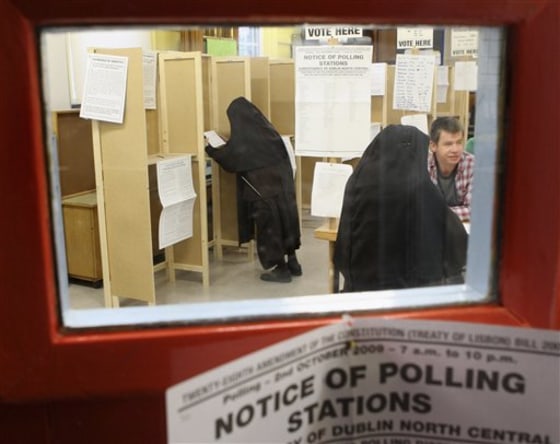The future of the European Union hung in the balance Friday as Ireland's voters decided once again whether to ratify a treaty aimed at making the 27-nation body more decisive and effective.
As polls closed following 15 hours of voting, the pro-treaty opposition party Fine Gael said its own national survey indicated a 60 percent "yes" vote. But aides to Prime Minister Brian Cowen said unofficial tallies from the ruling Fianna Fail party indicated a narrower "yes" majority of around 53 percent.
No professional pollsters or media organizations conducted exit polls. Official results come Saturday.
A second Irish "no" would doom the Lisbon Treaty, a painstakingly negotiated blueprint for sharpening EU institutions following the bloc's rapid eastward expansion since 2004.
EU chiefs say new voting rules are needed to promote stronger policies in combating cross-border crime, terrorism and ecological threats. But the treaty can't become EU law unless every member ratifies it — and Ireland is the only EU member requiring the treaty to win majority approval from voters.
Ireland rejected the treaty in June 2008, but is voting again after EU leaders reaffirmed Ireland's military neutrality, control over tax policies and right to keep abortion outlawed in this predominantly Catholic country. The EU also reversed its plans to prune the bloated size of the European Commission, the EU's executive arm, after the Irish registered strong opposition to losing their seat at the table part of the time.
Prime Minister Brian Cowen has ruled out staging a third vote — meaning an Irish "no" this time would kill, not just delay, a treaty several years in the making. Results come Saturday.
Damaging blow to government?
Opinion polls in the past week indicated a solid "yes" verdict this time around. And the exit poll by Fine Gael, the major opposition party and a staunch backer of the treaty, suggested this would be confirmed in Saturday's official figures.
Fine Gael said its activists quizzed 1,000 voters at 33 locations nationwide, a survey size that typically generates an error margin of three percentage points. The party said 60 percent had declared they voted yes, 40 percent no.
"These are very encouraging numbers for the yes side," said Billy Timmins, Fine Gael's director of elections.
Electoral officials said turnout among Ireland's 3.08 million voters was around 50 percent nationwide, similar to 2008's referendum, but higher in the key urban centers of Dublin and Cork.
Cowen and opposition leaders both emphasized that a second "no" would do the most damage to Ireland itself. The country's recession-hit economy requires European Central Bank support to revive its banks and combat a runaway deficit. Cowen says future foreign investment requires Ireland to be an EU enthusiast, not an outsider.
Treaty opponents accused the EU of seeking greater powers to impose unpopular policies on Ireland, including legalized abortion and euthanasia, increased immigration, higher taxes and lower wages.
One of the most emotive anti-treaty posters contended that passage of the treaty would slash Ireland's minimum hourly wage from euro8.65 to euro1.84 — a claim refuted by experts but readily swallowed by some working-class Dubliners.
"I can't scrape a living as it is and things are getting worse every month. Now the EU wants to drag our wages down to what they pay in Poland," said Gerard O'Driscoll, a 53-year-old taxi driver who spent Friday alongside scores of other cabbies blocking central Dublin roads to protest their falling incomes.
O'Driscoll said he sometimes already earned less than euro1.84 an hour because of too much competition, including from jitney immigrant cabbies who wouldn't join the protest. He said the only way to make the government pay attention to his plight was to "punch them square in the jaw and vote no."
Final answer
Many anti-treaty voters said they were incensed that their own government and EU chiefs refused to accept Ireland's initial "no" as a final answer.
"Governments try to steamroller us, whether it's in Dublin or Brussels. Just look what happens when we vote no. They make us vote again!" said Eugene Gorman, 27, who parked his bicycle — festooned with slogans saying "No. Seriously" — outside a polling station near Trinity College Dublin.
Others said they felt Ireland had no real choice but to support the EU now, given how Irish economic fortunes have collapsed following last year's 53.4 percent "no" vote.
"In good times, we can fancy ourselves as an independent country. We don't have that luxury this time," said Eithne Brennan, 35, who said "no" in 2008 but cast a pro-treaty ballot Friday in a polling station inside a Catholic girls' school. "The painful truth is we'd be bankrupt without Brussels."
Unchartered waters
If Lisbon becomes law, more policy decisions would be permitted by majority rather than unanimous votes in European summits. Those policies, in turn, would increasingly be shaped by the elected parliaments of each nation and the European Parliament, which currently has little say.
Projecting this more decisive EU abroad would be a new fixed-term president — in place of a decades-old system that rotates the presidency among governments every six months — and a new foreign minister.
But if Ireland does reject Lisbon again, the European Union would find itself in uncharted diplomatic waters. An alliance built on the principle of unanimous consent for key decisions would be faced with the reality that, under current rules, a country of barely 4 million can repeatedly block reforms designed to improve the lives of a continent of 500 million.
The response in that scenario could be negotiating a new treaty opening the door to a "two-speed Europe" — in which an inner core of like-minded nations could reach their own agreements, and unwilling nations like Ireland could tag along later. Most EU leaders consider this a dangerously divisive road but could be left with no viable alternative if the Irish shoot down Lisbon again.
